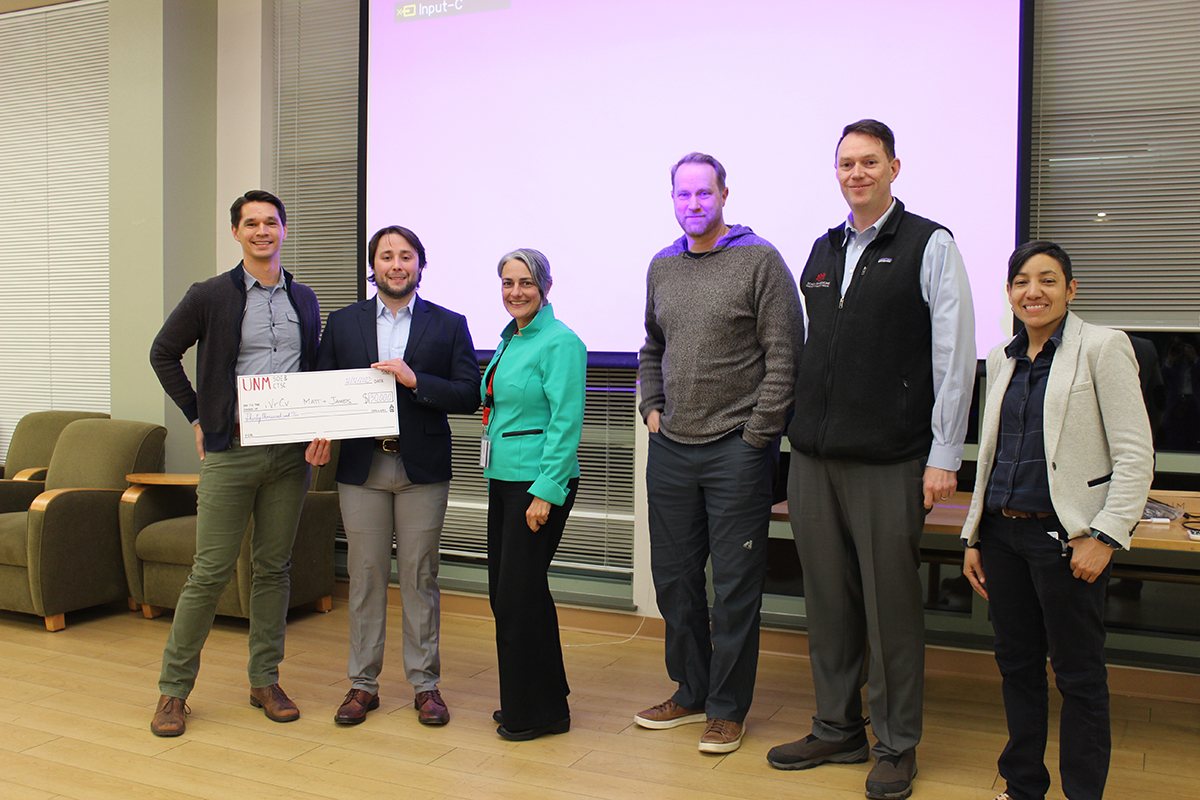Two student teams split $50,000 in biodesign competition
December 15, 2023

Top winners, “iVrCv: Immersive Virtual Reality Clinical Video,” with the judges and Christina Salas.
Two student teams won a total of $50,000 in awards in the annual Biodesign Pitch Competition Dec. 12, jointly sponsored by the School of Engineering and the Clinical and Translational Science Center in the School of Medicine at The University of New Mexico.
The contest is part of a graduate-level biodesign course that tasks students with addressing common problems that professionals in the medical field face. Student teams are then challenged to come up with innovative products and devices that address those needs and must provide a budget and a plan for further developing and commercializing their technology.
Student teams presented their ideas to a panel of judges — experts in engineering and the medical field — who then made the final selections.
Each year, a clinical focus area is chosen, and this year it was on prehospital care and emergency medical services.
The first-place team, winning $30,000, was “iVrCv: Immersive Virtual Reality Clinical Video.” The goal of the tool is to address the low pass and graduation rates of those in emergency medical training in New Mexico. The product introduces interactive virtual reality elements to increase engagement and retention of material. The team consists of Matthew Garret, a master’s student in mechanical engineering, and James Michael, a Ph.D. student in biomedical engineering.
The second-place team, which won $20,000 to further develop, test and commercialize their invention, was “ViTMAP — Vital Signs Triage, Monitoring and Prioritization.” This concept offered a new way to collect, monitor and document vital signs that allows for better prioritization, especially in a mass casualty situation.
Students on the team are Emmanuella Sangber-Dery, a Ph.D. student in chemistry and chemical biology; Ahmed Mohammed, a Ph.D. student in mechanical engineering; and Anshika Mishra, a Ph.D. student in biomedical engineering.
Other teams who presented were:
“App for Improving the Mental Health of EMS Workers," with Auron Joyner and Brandon Doehne, both undergraduates in mechanical engineering, and Aidan Leyba, a master’s student in biomedical engineering.
“Real-time Vital Monitoring Systems (RVMS) for Ambulance,” with Adhitya Bantwal Bhandarkar, a Ph.D. student in electrical engineering; Ranjith D. Janardhana, a Ph.D. student in mechanical engineering; and Swastika Tenkila Purushotham, an M.S. student in computer engineering.
“Water Heating Enhancement and Cooling Temperature Regulator (WHECTR),” with Andrew Gilbert, an undergraduate in electrical engineering; Evan Lucero, a master’s student in mechanical engineering; Ashley Tafoya, a Ph.D. student in biomedical engineering; and Kali Wolf, a master’s student in biomedical engineering.
The contest is part of a graduate-level biodesign course that tasks students with addressing common problems that professionals in the medical field face. Student teams are then challenged to come up with innovative products and devices that address those needs and must provide a budget and a plan for further developing and commercializing their technology.
The competition is led by Christina Salas, associate professor in the Department of Orthopaedics & Rehabilitation as well as the departments of Chemical and Biological Engineering and Mechanical Engineering. In addition, she is director of the Biomedical Engineering Graduate Program in the School of Engineering and special assistant to the dean of engineering for Health Science Relations.
This year’s judges were Donna Riley, Jim and Ellen King Dean of Engineering and Computing; Matthew Campen, director of the New Mexico Center for Metals in Biological and Medicine and Regents’ Professor of pharmaceutical sciences at UNM; and Dr. Justin Baca, an associate professor of emergency medicine and practicing physician.
The competition is the culmination of a graduate biodesign course taught by Salas. During the semester, students get a crash course in the medical specialty selected for that year — talking to doctors, nurses, and patients and touring important medical facilities to learn about real-life clinical challenges that are waiting on a solution. Students spend two to three weeks in this medical setting, immersing themselves in clinical problems and familiarizing themselves with the medical specialty. Then, supervised by Salas, break up into teams to research and design a technology that can address a clinical problem in that specialty.
